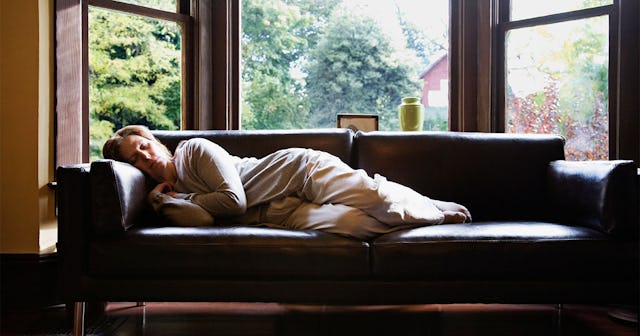I Didn’t Know Depression Until My 40s

My older sister was diagnosed with depression and bipolar when she was a teenager. It was in the early ‘90s, and there was almost zero information out there about depression and teens.
My father thought she was faking it and turned his nose up when it came to getting her any treatment or medication. He thought she was doing it for attention. My mom came through for her, thankfully. My parents were divorced and she was on an antidepressant, something he didn’t let her do when they were married.
I also have two younger sisters who both struggled when they were teenagers and started taking an antidepressant in their 20s. My youngest sister tried to fight it on her own. After her daughter was born and a few months old, she spent a few days in her room, alone. She couldn’t talk to anyone, she couldn’t care for her daughter, and she told me it felt like she was underwater.
It was after that when my grandmother (on my father’s side) finally told us how many people on her side of the family were on antidepressants (not her, though!) and that maybe it ran in our family (you think?).
Now even my father takes an antidepressant, and he is truly a different person — but he was in his 60s and it took a lot of convincing from his siblings to get the help he needed.
Then there was me. Since my sisters and the rest of my family struggled with depression and I didn’t, I’ve always carried some guilt about it. I wondered why I was different, and I didn’t understand what they were going through.
When my sister would cancel plans because she couldn’t get out of bed, I would be angry. When we would have a family gathering and my siblings weren’t social, I didn’t get it. When they talked about taking time off from the job, or needing time away from their kids because of their mental health, I thought, “Toughen up, man!”
Perhaps part of that was the upbringing from my father, the one who thought being depressed was something people made up to be lazy. But more than that, I couldn’t relate — and so I just didn’t understand what it felt like to not be able to lift my head off my pillow, get dressed, or open my mouth to talk to people.
Then I turned forty.
My depression started as feeling slightly panicked all the time, yet not knowing why. I was telling my then-husband about it one day before he left for work. “I don’t know what is wrong with me, but something is wrong.”
He stared at me, not knowing what to say, and told me it would be fine, but he had to go to work.
Never, ever tell someone who is struggling with depression and anxiety it will be fine, don’t worry, then leave — nothing makes them feel more invalidated.
That was six years ago, and things have progressively gotten worse. I think of my anxiety and depression as a slow burn that’s always there, even when I’m happy. Then it flares up and takes everything out of me. I can’t think, I have no energy, and I stare at the ceiling or television for hours. It’s almost as if my anxiety leaves me numb for a period of time before I come back.
It has changed me in ways I didn’t know I could be changed. It affects me physically, and I find myself thinking about my sister during those weeks when I can’t lift my head from the pillow.
A few weeks ago, my kids were with their dad, and I missed them deeply. I slept off and on all day and went to bed at 7:30 p.m. at night. I wasn’t sad. I wasn’t hungry. I had zero interest in anything.
I didn’t feel like talking to anyone, and I wasn’t able to return text messages.
My body felt a heaviness it has never felt before, and I thought, This is what my sister was talking about. How could I have not understood this? This is what I deserve for not being more understanding.
It was then I realized something: It was time to call my doctor and get help. I’d always thought that I would be free and clear of depression. After all, I was the only one in my family who wasn’t on medication, and I could honestly say depression had never been an issue in my life for a really long time. I had the “baby blues” and postpartum anxiety with all my kids, but that passed, so I figured I was never going to be affected by depression.
But I found myself struggling in my 40s when my kids were growing up, before I started perimenopause, before I got a divorce, before I knew what hit me.
It’s not an easy thing to face when you go your whole life feeling alive, happy, social, and content, then slowly turn into someone who can’t handle loud noises or be social because you’re filled with anxiety and depression. But this is where I am.
It’s about self-acceptance, taking it one day at a time, and paying attention to what I need on any given day, instead of comparing this new me to the old me.
The one thing I refuse to do is to tell myself — or anyone else going through this — that everything will be fine and leave them to deal with it. Tough love doesn’t cure depression.
Getting help makes it bearable, so if you are going through something similar, don’t just sit back and try to “let it pass” like I did.
This article was originally published on